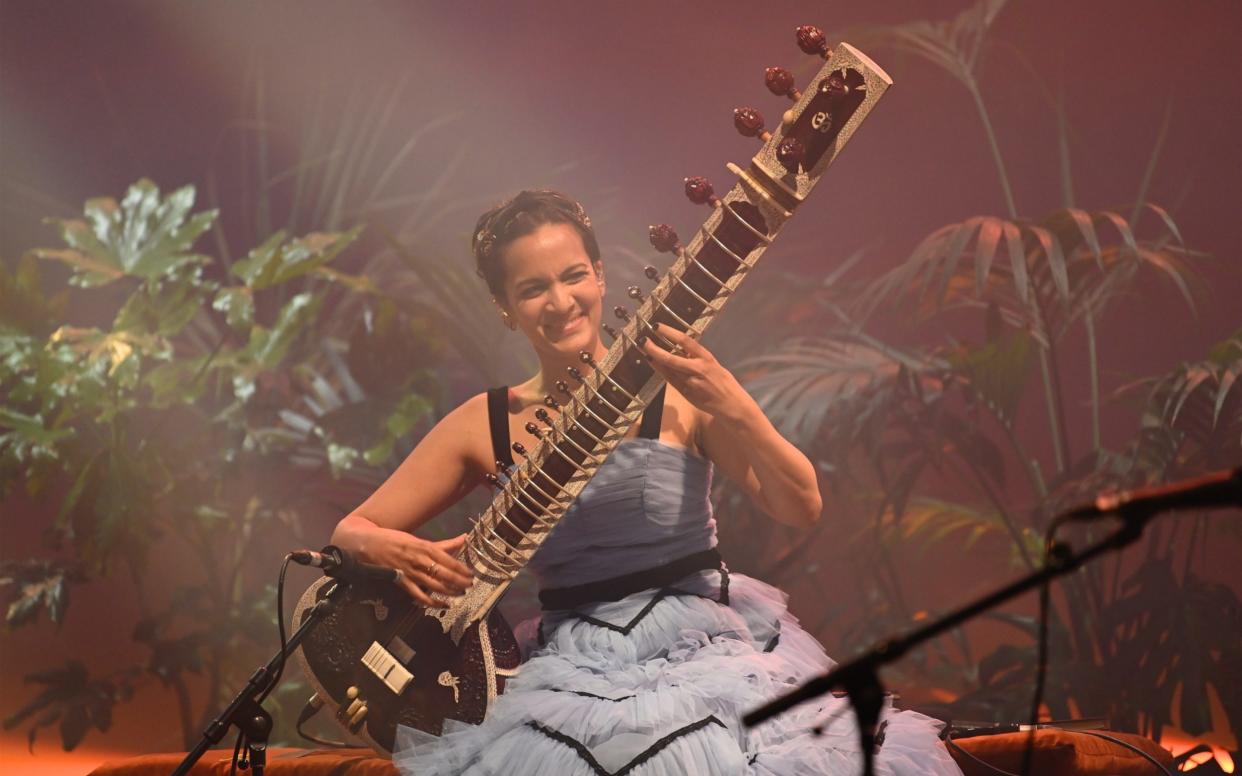Anoushka Shankar, Royal Festival Hall, review: an unexpectedly emotional return to the South Bank

In April 2020, Anoushka Shankar was due to host a star-studded concert at London’s Royal Festival Hall to mark the centenary of the birth of her father, the sitar legend Ravi. She would have been joined by the British musician and composer Nitin Sawhney, George Harrison’s widow Olivia, and a host of Indian classical musicians. The concert would also have seen Shankar perform on stage with her half-sister, the singer Norah Jones, for the first time.
Covid-19 put paid to that show, which has been pushed back to 2022, but it was only fitting that 39-year-old Shankar, a lauded and breathtaking sitarist in her own right, was at least able to perform at the Southbank Centre’s reopening weekend. Despite the Magaluf vibes of the sun-drenched hordes outside the Royal Festival Hall, life was more sedate inside. The bars remained closed, and social-distancing measures meant ranks of empty seats between ticket-holders. But within its confines, this concert -– which was also live-streamed – burst with expression and humanity.
The stage was set for maximum atmosphere: under soft light and swirling dry ice, a low dais and ornamental rug were surrounded by a bewildering array of potted plants. When Shankar herself appeared, her feet bare beneath a voluminous tiered skirt, she skipped for joy. “My heart’s beating so fast. You’re my first audience for 15 months. I’ll never take this for granted again.”
As well as being an exemplary sitar player, Ravi Shankar was fêted for fusing Eastern and Western musical traditions back in the 1960s. His daughter’s music is more nuanced than that: it fuses both contemporary and classical structures and electronic and acoustic textures, with the sitar as its backbone. Traditional Indian ragas (melodic frameworks) are in evidence, but there are elements of Radiohead, Philip Glass and Joni Mitchell too. It’s shape-shifting and brilliantly footloose.
The concert revolved around songs from last year’s EP Love Letters, a devastating break-up album written by Shankar after her divorce from Atonement director Joe Wright. It’s a snapshot of a period of profound shocks and heartache. In the same month that they announced their separation, Wright was seen in public with The Girl on the Train actress Haley Bennett. The songs were delivered here in their rawest form. The ghostly ‘Bright Eyes’ was sung by the 37-year-old English singer-songwriter Emmy the Great. Although Wright isn’t mentioned in the song, it contains the lyrics: “Does she feel younger than me as you’re lying in your bed? / Does she feel younger than me or is that in my head?” The song ended with the powerful line: “But most importantly, do you call her Bright Eyes too?”
But if the Love Letters songs documented sadness and confusion, Shankar’s new tracks suggested a restirring of passion. New single ‘Opening, Flowering, Drinking’ was about people you want to hug – “or more than hug,” Shankar said with a smile. The recorded version is sung by Jones, but vocal duties here were carried out by Nicki Wells, who -– like Emmy the Great – sat at Shankar’s feet. There was pointed humour as well. On ‘Sister Susannah’, Shankar recited a checklist of saintly requirements from the perspective of an unnamed man to his female partner (“Be pretty… Ignore my faults”). It was eviscerating.
Shankar’s emotions threatened to get the better of her at the end, when she talked about how the pandemic is ravishing India. “We’ve all lost a lot,” she said. And the delight of watching this concert was almost overwhelming at times. To be served up something so rich and detailed, so expressive and heartfelt, so considered and visually compelling, and after so long, was a treat. At a time when life remains so perilous for so many, it was also bittersweet. But the five-minute standing ovation at the end said it all: this was a joyful reminder that life and art, in all their knotty complexities, go on.
Solve the daily Crossword

